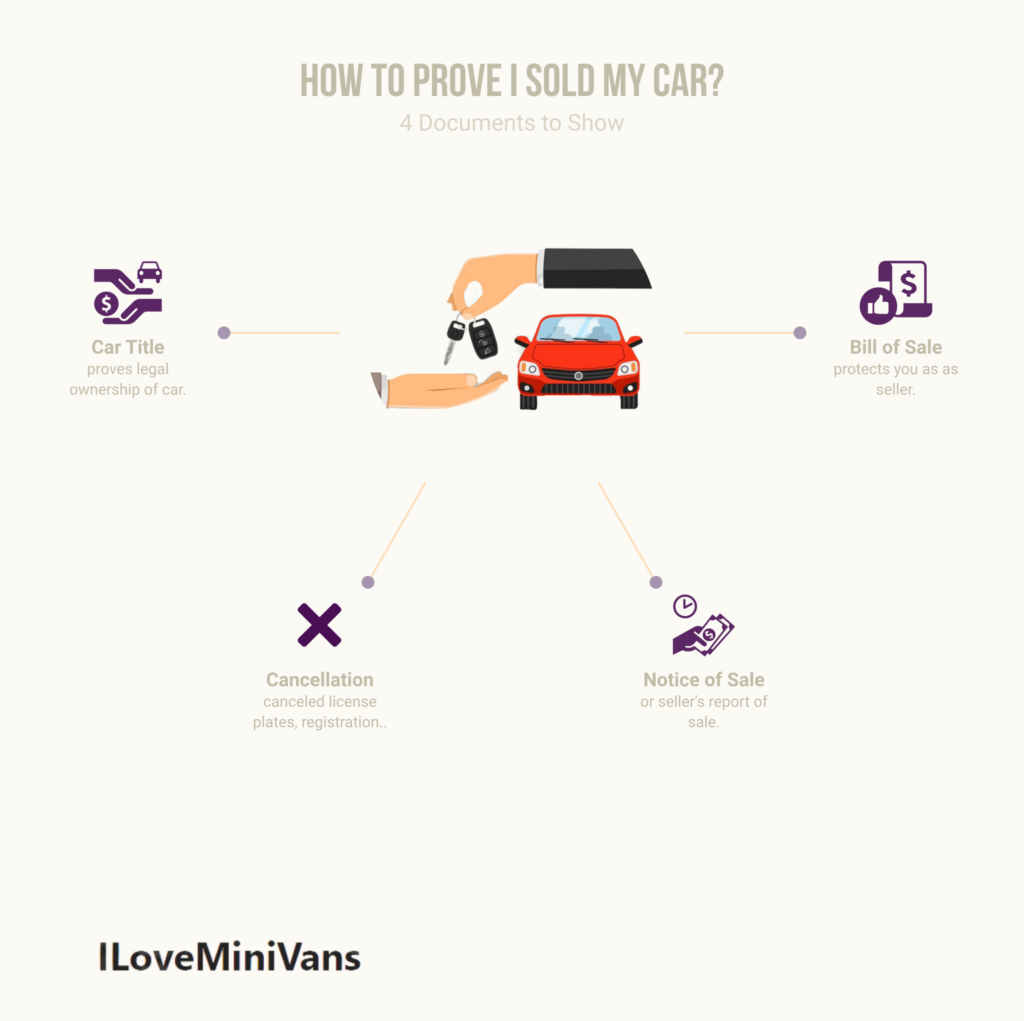Have you recently sold your car? Unfortunately, it doesn’t end when you get the money. You need to prove you’ve sold it. After all, any scenario involving the car will still be linked to you. So, you may be wondering how to prove I sold my car?
To prove you’ve sold it, you need to present the documents you had when you sold the car. These would serve as a solid basis to support your claim.
From copies of the official bill of sale to the car title, here’s what you need to show to prove you’ve sold your car.
How to Prove I Sold My Car?

Here are the crucial files you must have to prove you’ve sold your car in case of authority questions your involvement with it:
✔️ Car Title
A car title is a municipal- or state-issued document identifying a vehicle’s legal owner(s). It gives solid documentary evidence of the ownership of the automobile. As a seller, you need to have the car title to be able to transfer ownership to your buyer legally.
Get a copy of the title from your local DMV if you don’t already have one on hand. Either way, you need to do this before legally selling a car. You need to sign the back of the car title and write the date of sale, sale price, and odometer reading.
Aside from that, here are a few proven tips to consider when getting a car title for a seamless process:
- Always double-check your VIN. You need to write the vehicle identification number (VIN) of the car sold to the title. It should also match the VIN on the car’s windshield, so write carefully!
- Compare the odometer reading. When getting a car title, you need to ensure you’re signing it with a 100% accurate odometer reading. Generally, the car’s mileage should match the one in the title.
- Use pens with blue or black ink when signing a car title. These hues hold up longer, making your documents viable long-term.
- Sign in the right spot. Your and the buyer’s signature should be on the correct lines. After all, any issues here will require a do-over, which can be time-consuming. So, read the fine print before signing the car title!
- Double-check for liens. Always check with your local DMV to ensure you have no liens against the car sold. You need to pay these before getting the car title if you do have some.
Finally, when getting a car title, don’t forget to make a copy of it. And remember, both parties involved should sign the document! Afterward, you need to give it to the buyer or mail it to your local DMV.
Either way, getting a copy of the car title gives you solid proof of ownership before selling the vehicle. This way, you’ll be able to get out of sticky situations involving your old cruiser.
✔️ Canceled License Plates and Registration for the Car
Solid evidence proving you’ve sold your car includes the following documents:
- Canceled license plates
- Canceled registration
You need to cancel your license plates and registration to the car to prove that it isn’t yours anymore. Doing this gives you solid evidence that the vehicle is no longer in your hands if an issue arises.
Generally, most states require sellers to keep these documents and return them to the DMV. Or you can also transfer them to your new vehicle.
Meanwhile, some states require license plates to stay with the sold car and its new owner(s). If so, you might need to cancel your registration from the vehicle to remove your liability from it. You can do this online or visit your local DMV office.
I suggest going to your state’s DMV’s official website to see the specific rules on canceling registration and license plates.
Aside from those two, remember to let your insurance company know you’ve sold your car. This way, your insurer can cancel the policy on the vehicle. But ensure to return the plate and cancel your registration before ending your insurance plan in the sold vehicle to avoid penalties.
Also, never cancel the insurance plan if you’re still registered on the sold vehicle. Doing this may lead to hefty fines.
Either way, canceling your insurance policy can prove that you sold the car. Your local authorities may inquire and call your car insurance company or DMV to verify that you’re no longer the owner of the sold car.
✔️ Notice of Sale Form (Seller’s Report of Sale)
The notice of sale form can prove that you sold your car. I suggest getting this and submitting it to your local DMV office as soon as possible. It shows that you’ve sold your vehicle, and it is no longer your responsibility.
I suggest getting the notice of sale form as early as possible as it may take a while to process. Once processed, your state DMV will have the notice of sale form documented. This makes it official that you are no longer the car owner and aren’t liable for any issues that might arise after.
✔️ Bill of Sale
Although a bill of sale isn’t needed when selling cars in a few states, it’s better to be prepared. This document can protect you and your private buyer from any disagreement that may arise after securing the deal. And the best part is creating one is easier than most would think. You can make one following the many available templates online.
Here’s an overview of writing a bill of sale to prove you’ve sold your car:
Begin with the title, “bill of sale,” and add all details of the car sold. These include the following:
- Year of manufacturing
- Model of the car
- Accurate odometer reading
- Vehicle identification number (VIN)
- Selling price
Once added, create a subheading indicating “seller” and put your name and address. Then make another one for the “buyer” and instruct them to fill out their name and address.
After filling out the bill of sale, you two need to sign the document. Once everything’s in place, submit the paper to your local DMV office alongside other required forms. Also, remember to make copies of the bill of sale to protect yourself as a seller.
Overall, having a bill of sale will help you prove that the car’s ownership has been legally transferred.
Do I Still Need to Prove I Sold My Car if I Didn’t Sell It Directly?
If you’ve decided to work with a dealership or a third-party company to sell your car, you may not need to deal with the buyer directly. It’s up to them to transfer the car title and other documents required. But there’s no guarantee that they will, leaving the burden to you. So, it’s better to be prepared and gather the needed paperwork to prove you’re no longer the car owner.
Ensure the title transfers are done correctly. If not, you may still be responsible for the vehicle you no longer own.
For instance, if you’ve traded in your car with a dealership and the new owner doesn’t update its title within 30 days, and they get into a collision, you’ll be held liable. After all, the car is still legally registered to you. Now you’re stuck with a penalty and fine that wasn’t your fault because the dealership and new owner didn’t transfer the car title correctly.
So, it’s best to contact the dealership or your local DMV office to revoke the car title.
To save time, confirm with the dealership or new owner that the car title and other needed documents have been appropriately transferred. And remember to keep proof of sale and other supporting documents if you must dispute issues that arise afterward.
Are You Thinking of Selling Your Car? Here’s How You Can Protect Yourself!
Now that you know how to prove that you’ve sold your car, your future transactions should be easy enough to handle. But did you know that you may also take some precautions during the selling process? Here’s what you need to keep in mind when selling a car:
Keep a Paper Trail
If you’re planning on selling your car, you must maintain a paper trail. Keeping one can help lessen the work down the road. As mentioned earlier, car titles are one of the best pieces of evidence to prove you’ve sold your car. And though different states have varying rules about proper title transfers, it pays to fill out the paperwork early on!
Aside from that, you also need to complete a bill of sale alongside a release of liability form. These documents offer proof of the transfer, protecting you, as the seller, from fines.
Finish the Title Transfer
Most states require sellers to sign the car’s title over to the buyer after the sale. You also need to give the new owner a recent emission test or smog check showing your car passed before transferring ownership. Alternatively, you can also opt for a state inspection certificate. Either way, these are crucial documents you need to have during the actual time of sale.
Meanwhile, some states recommend that sellers inform their county’s tax assessor’s office of the recent car sale. This way, you’ll be able to protect yourself if your buyer fails to title the vehicle appropriately.
Luckily most private car sales go on without issues, giving more money to sellers. Still, it’s better to be prepared and take preventive measures to protect yourself.
Frequently Asked Questions
Q: How to prove I sold my car and transferred ownership?
A: You can prove you sold your car with a certificate of title. Plus, you can transfer ownership to the buyer by signing this document and bringing it to the DMV. They’ll issue a new registration and certificate of title for the vehicle you sold. Some states may need additional documents for this process, like the bill of sale.
Q: Do I need to inform the DMV office if I have sold my car?
A: Different DMVs from various states have differing requirements. But generally, most need the seller’s notification regarding the mileage and condition of the car sold. If your current title for that doesn’t have an area to disclose this info, your local DMV might be able to help.
Q: How can I get a car title to prove I sold my car?
A: Usually, car dealerships send the car title to the DMV. If you don’t have access to the car title, you can ask for it from your local DMV. Or, you may seek your title paperwork from the state transportation or revenue agency. Either way, they will send you the title once they finish processing the paperwork.
Q: Is it possible to obtain my car title online to prove I have sold my car?
A: If you’re looking to get a replacement car title, it is possible to get one online. A car title showcases that you are the rightful owner of the vehicle sold. Usually, state governments issue car titles through the DMV or similar agencies. Alternatively, you can get one in person or by mail.
Q: Is it legal to sell a car without a title?
A: It’s not possible to sell a car without a title, as this document indicates the legal ownership of the vehicle. Regardless of the state, the law requires a certificate of title to get any car on the road. So, if you’re looking to sell or have sold a car without one, get your car title from your local DMV.
Final Words
How to prove I sold my car? From the bill of sale, and certificate of title, to the license plate cancellation: these are the documents you need to prove you’ve sold your car. Regardless of the model of the vehicle or what state you live in, these should be enough to show you made a legal sale. So in case an issue comes up with your previous car, be prepared and show proof that you no longer own it.

